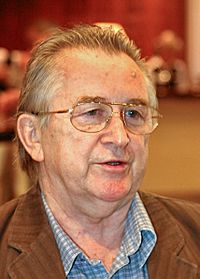Kazimierz Kutz facts for kids
Kazimierz Julian Kutz (born February 16, 1929 – died December 18, 2018) was a very important Polish film director, writer, and journalist. He was also a politician and served as a deputy speaker in the Senate of Poland. Kutz was known as one of the key people in the Polish Film School movement.
Contents
Who Was Kazimierz Kutz?
Early Life and Education
Kazimierz Kutz was born on February 16, 1929, in Szopienice, which is now part of Katowice. His father worked on the railway, and his mother had been involved in the Silesian Uprisings.
After World War II, Kutz finished high school in Mysłowice. In 1949, he was accepted into the famous Łódź Film School. He finished his studies in 1954. After that, he started working as an assistant to Andrzej Wajda, another very famous Polish film director.
A Career in Film and Theater
Kutz made his first film, Krzyż Walecznych, in 1959. Over his career, he directed more than 20 movies. Six of these films were about his home region, Silesia, showing its unique traditions and challenges.
He also directed many plays for theaters across Poland. These included big stages like the National Stary Theatre in Kraków and the National Theatre in Warsaw. He also directed plays for Polish television. In 1972, he started the Silesia Film Company in Katowice and was its Artistic Director until 1978.
Working in Television and Teaching
In the 1970s, Kazimierz Kutz became a main director for the Polish Television branch in Katowice. He also worked with many cultural groups.
In 1981, a time called Martial Law in Poland began in Poland. During this time, the government took strong control. Kutz was briefly held by the authorities but was released soon after.
From 1981 to 1983, he taught at the Silesian University in Katowice. Later, from 1985 to 1991, he taught directing at the Higher Theatre School in Kraków. He continued to lead the Polish Television Centre in Katowice and Kraków until 1991.
A Voice for Silesia
Kazimierz Kutz was deeply involved in the issues of Silesia. His films often showed the traditions and problems of this region. Because of this, many people saw him as a spokesperson for all Silesians.
In a poll by the Gazeta Wyborcza newspaper, he was voted the third most famous Silesian ever. He was the most famous among people who were alive at the time. In 1997, he received a special honorary degree, called a doctor honoris causa, from the University of Opole.
He supported many cultural events and groups in Silesia. These included film festivals, art festivals, and the Cultural Congress of the Upper Silesia. He also strongly supported the development of the Silesian language.
Political Career
In 1997, Kutz decided to enter politics. He ran for a seat in the Senate of Poland, which is like a parliament. About 500,000 Silesians supported him.
He was elected again in 2001 and 2005. He served as the deputy speaker of the Senate of Poland. For all his work for society, he received many of Poland's highest awards.
Kazimierz Kutz was married to Iwona. He had four children: two sons named Gabriel and Tymoteusz, and two daughters named Wiktoria and Kamila. He passed away on December 18, 2018, at the age of 89.
Films Directed by Kazimierz Kutz
- 1958 - Krzyż walecznych
- 1960 - Nikt nie woła
- 1961 - Tarpany
- 1961 - Ludzie z pociągu
- 1963 - Milczenie
- 1964 - Upał
- 1966 - Ktokolwiek wie...
- 1967 - Skok
- 1969 - Salt of the Black Earth (Sól ziemi czarnej)
- 1971 - Pearl in the Crown (Perła w koronie)
- 1974 - Linia
- 1975 - Znikąd donikąd
- 1979 - The Beads of One Rosary (Paciorki jednego różańca)
- 1983 - Na straży swej stać będę
- 1986 - Wkrótce nadejdą bracia
- 1993 - Straszny sen Dzidziusia Górkiewicza
- 1994 - Reverted (Zawrócony)
- 1994 - Śmierć jak kromka chleba
- 1995 - Colonel Kwiatkowski (Pułkownik Kwiatkowski)
- 1997 - Sława i chwała
- 2004 - Stare srebra
 | Dorothy Vaughan |
 | Charles Henry Turner |
 | Hildrus Poindexter |
 | Henry Cecil McBay |



